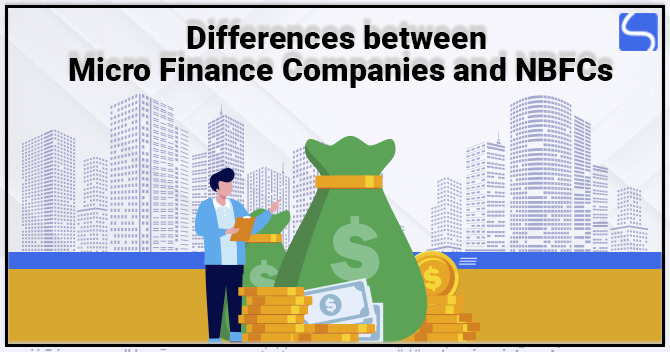How to Start a Micro Finance Institution in India?

Karan Singh | Updated: Mar 09, 2021 | Category: Microfinance Company, RBI Advisory
The purpose of establishing a Finance Company in India is to provide loans to commercial customers and individuals. Similarly, a microfinance company fulfil the financial needs of businesses and individuals on a smaller level. Basically, they help those poor people who cannot access mainstream banking and financial services. If your thoughts are evident, the process to start a Micro Finance Institution in India may not be a discouraging task. Your customers may include minor and negligible companies/farmers/entities/businesses belonging to the unorganized sectors. The reasons for taking a loan may be different for each customer. In this blog, we discuss how to start a Micro Finance Institution in India.
Table of Contents
An Overview of Micro Finance Institutions in India
At present, India is one of the largest emerging markets for Micro Finance Institutions. In India, many of the population live in rural areas and villages where commercial banking support is out of reach. People who come under the lower-income group take the easy-going financial support channel like pawnbrokers and moneylenders. This means paying a high-interest rate and being forever under debt, and such debtors cannot value the country’s economic development.
In rural areas and villages, small finance banks prove to be useful. After obtaining a small finance bank license from RBI or the Reserve Bank of India, they can offer three services such as credit, savings, and insurance. Mainly, the loan amount is less than Rs. 50,000. Such institutions offer loan without demanding any security or marginal money. Also, the borrowers get much easier repayment facilities and these micro-financing institutions, however charging a higher interest rate than those in the urban areas, still charges very less than private moneylenders.
The Indian Government has understood the importance of such entities for developing backward sectors and rural sectors. In acknowledgement of the same, the Reserve Bank of India has released guidelines regarding how to start a Micro Finance Institution in India.
What are the Goals of Micro Finance Institution in India?
With Micro Finance Institutions in India, the communities have better access to funds and capital. Thus, Micro Finance Institutions support development goals through various financial services, resources, and programs. Below you can check the goals of MFIs in India:
- Providing access to protection and health care insurance.
- Providing access to more environmentally-friendly agricultural inputs.
- Strengthening women’s participation in activities of decision-making and generating livelihood at the community and household levels.
- Educating the public about better resource management can boost the sustainability of income-generating activities and natural resources.
- Increasing the modes of earning a living for low-income people and creating opportunities for self-employment and may reduce the impact of natural tragedies.
- Training rural peoples in basic skills and enable them to use the available resources and contribute to income and employment generation in rural areas.
How can you start a Micro Finance Institution in India?
Before starting any business in India, you require in-depth knowledge of the customer’s needs. Moreover, it would be best to have a proper Business Plan in place charting the track to success. So, you need to follow a step by step process to start a Micro Finance Institution in India successfully. For this, the first condition is to comply with the strict regulations and meet all the requirements of initial funding. Before establishing your finance bank, you need to decide whether you want to set up your Micro Finance Institution as a Non-Profit Institution or a Profit Institution.
Start a Non-Profit Micro Finance Institution in India
A Non-Profit Micro Finance Institution is registered as Societies/Trusts/Companies under the appropriate acts. Those are Societies Registration Act 1860/Trust Acts 1882/Companies Act 2013, respectively. Micro Finance, generally called Micro-Credit, needs to take Section 8 Company Registration of Companies Act, 2013.
Start a Profit Micro Finance Institution in India
A Profit Micro Finance Institution can be registered as a Co-operative Society or an NBFC (Non-Banking Financial Company). By the way, an unregulated Non-Profit NGO can be transformed into a regulated and for-profit institution. This way of managing the company would attract market investors. They are registered under the Reserve Bank of India who is also a supervising and regulatory authority. Their performance and other values need to be maintained and, if possible, improved to assure good investment for the investors. In fact, today’s big Micro Finance Institutions in India started as Non-Profit MFIs. For example, India’s two largest Micro Finance Institutions are Spandana Microfinance and Swayam Krishi Sangam (SKS), also started as Non-profits, they converted into Profit Finance Companies. Always remember that investors would want to make sure that their investments earn higher returns.
What are the documents obligatory to start a Micro Finance Institution as a Section 8 Company?
Following are some vital documents necessary to start a Micro Finance Institution as a Section 8 Company in India:
- Submit a copy of identity proof of all the directors or shareholders of the company such as PAN Card, Aadhar Card, Voter ID, Driving License, etc.
- Submit the address proof of all the directors and shareholders of the company, such as Rent Agreement (in case of a rented house), latest utility bills (electricity bills, phone bills, water bills, gas bill, etc.), and bank statements.
- Submit any address proof for the registered office of the company would include a NOC (No Objection Certificate), Ownership, and the latest utility bills (electricity bills, phone bills, water bills, gas bill, etc.)
Registration Process of Micro Finance Company as a Section 8 Company
You can start a Micro Finance Institution NGO registered as a Trust, Society or a Company in India. Another name of NGO registered as a Company in Section 8 Company. Section 8 Companies have greater credibility amongst Government Donors, Departments, and Stakeholders. Below you can check some of the benefits of doing business as a Section 8 Company:
- According to Section 8 of the Companies Act, the registration process is much easier and affordable.
- It is not compulsory to get approval from the Reserve Bank of India (RBI). It is only required to comply with its guidelines concerning processing charges and interest rates.
- The number of compliances required is less than other Micro Finance Institution (MFI).
- There is no minimum Ceiling for Fund-Raising.
- The processing fee is not more than 1% of the total loan amount.
- The average interest rate is not more than 26%.
- Loans can be granted by following the guidelines under the significant Sections.
- In the case of insurance, the premium fees must be the actual cost of the Group/Health/Life insurance and nothing extra.
- Can grant unsecured loan amount up to Rs. 50, 000 to small businesses in India. The limit to grant a loan for residences and dwellings is Rs. 1.25 lakh.
- Public Deposits are not accepted.
Step by Step Registration Process
To start a Micro Finance Institution as a Section 8 Company, at least two directors are required in India. To complete the registration process as a Section 8 Company, you need to follow the steps as mentioned below:
- First, you have to search for a unique name and get the name approved by the Registrar of Companies (ROC). Remember that the company’s name should be unique and distinctive; if it is not, then your application gets rejected. A minimum of six names can be filed at one time.
- Once you choose the company’s name and get approved by the Registrar of Companies, you have to obtain DSC (Digital Signature Certificate) and DIN (Director Identification Number).
- Once you obtain DSC and DIN, then the applicant can apply for a license to do social work in India from the Central Government of India.
- On the receipt of license approval, apply for incorporation of the company. The application has to be surrounded with all the essential attachments like MOA (Memorandum of Association), AOA (Articles of Association), Declarations, etc. Wherein your company will get a Certificate of Incorporation (CoI).
- Once you get a Certificate of Incorporation of the company, you can obtain PAN and TAN for your Section 8 Company.
What are the documents obligatory to start a Micro Finance Institution as an NBFC?
Following are some vital documents required to start a Micro Finance Institution as an NBFC:
- Submit KYC (Know Your Customer) documents of all the directors and shareholders of the company.
- Submit an income proof of all the directors/shareholders of the company.
- Submit any educational qualification or professional qualification, along with the work experience certificate in the field of the financial sector.
- Submit a net worth certificate of the shareholders, directors and the company.
- Submit Memorandum of Association (MOA) and Articles of Association (AOA) of the NBFC representing the financial/lending/investment business.
- Submit a Certificate of Incorporation of the company.
- Obtain a Certificate of Banker of No Lien supporting NOF (Net Owned Fund) of Rs. 5 crores.
- Submit a report of the banker about the company and its group.
- Submit an action plan about the Fair Practice Code, Loan Products, and Credit and Risk Assessment Policy.
- Submit a detailed structure plan of an organization.
- Submit a Board Resolution passed in favour of NBFC Formation.
- The process of decision making for rejection or approval of a loan application.
Registration Process of Micro Finance Company as an NBFC
An NBFC-MFI is allowed to offer the micro-loans to a special type of borrowers or customers only. Before we start the registration process, let us first discuss the features of it, and you can check the same below:
- Micro Finance Institution is a Non-Deposit taking Non-Banking Financial Company (NBFC).
- Small Finance company, as NBFC can use SHG (Self Help Groups) to midway the financial transactions.
- At least one of the company or director themselves must have experience of more than ten years in the financial service sectors.
- An NBFC- Micro Finance Institution have a paid-up capital of Rs. 5 crores.
- It should be a member of CICs (Credit Information Companies).
- Moreover, it should be a member of at least one Self-Regulatory Organizations (SEBI, IRDA, SIDBI, RBI, or NABARD).
- For registration as an NBFC, the Micro Finance Company shall have CIBIL Membership.
- The License to operate a Non-Banking Financial Company is to be applied from the Reserve Bank of India, subjected to the fund capital.
- The loan provided to the customers or borrowers having an annual income of less than one lakh rupees for rural areas or one lakh sixty thousand rupees for semi-urban areas.
- Any borrower cannot borrow an amount of more than Rs. 50,000 at first borrowing. The upper limit for all borrowers is Rs. 1 lakh. But, a specific borrower shall not have a loan of more than Rs. 1 lakh at a time.
Registration Process of MFI as an NBFC

- Step 1: Company Registration: The first and most essential steps of the registration process is to get your financial institution registered as a Company. You can commence by getting your financial company registered as a Public Limited Company or Private Limited Company in India.
- Step 2: Raising Capital: It is compulsory for an NBFC Registration having a minimum authorized and paid-up capital of Rs. 5 crores. So you must arrange to raise the Net Owned Fund up to this amount at least once your company gets registered.
- Step 3: No Lien Certificate: First, you have to deposit Rs. 5 crores as a fixed deposit and get a No Lien Certificate from the bank.
- Step 4: Register with RBI: To start a Micro Finance Institution as an NBFC, you have to file an application online with the Reserve Bank of India (RBI). This application has to be filed with other related documents. Once you successfully submitted the application form with all the vital documents, your company will receive a CARN (Company Application Reference Number). This reference number must be used in future communications with the Reserve Bank of India (RBI).
- Step 5: Filing with the RBI: Once you filed the application, send a hard copy of the application form and all the vital documents to the Regional Office of the Reserve bank of India (RBI).
Conclusion
Now, India is one of the greatest emerging markets for Micro-Finance Institutions (MFI). With a big part of the Indian population-based in villages and rural areas, where the traditional banking assistance is out of reach, Micro-Finance Institutions has been able to penetrate such places. The above-mentioned procedure can be followed to start a Micro Finance Institution in India.
Also, Read: Step by Step Procedure for Micro Finance Company Registration














